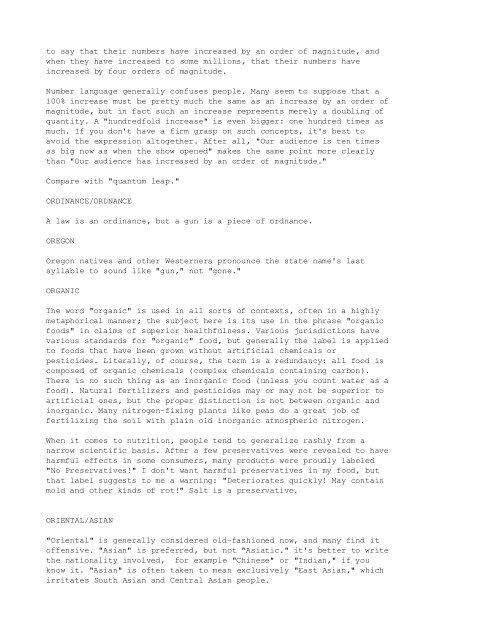Common_Errors_in_English_usage
Common_Errors_in_English_usage
Common_Errors_in_English_usage
Create successful ePaper yourself
Turn your PDF publications into a flip-book with our unique Google optimized e-Paper software.
to say that their numbers have <strong>in</strong>creased by an order of magnitude, and<br />
when they have <strong>in</strong>creased to some millions, that their numbers have<br />
<strong>in</strong>creased by four orders of magnitude.<br />
Number language generally confuses people. Many seem to suppose that a<br />
100% <strong>in</strong>crease must be pretty much the same as an <strong>in</strong>crease by an order of<br />
magnitude, but <strong>in</strong> fact such an <strong>in</strong>crease represents merely a doubl<strong>in</strong>g of<br />
quantity. A "hundredfold <strong>in</strong>crease" is even bigger: one hundred times as<br />
much. If you don't have a firm grasp on such concepts, it's best to<br />
avoid the expression altogether. After all, "Our audience is ten times<br />
as big now as when the show opened" makes the same po<strong>in</strong>t more clearly<br />
than "Our audience has <strong>in</strong>creased by an order of magnitude."<br />
Compare with "quantum leap."<br />
ORDINANCE/ORDNANCE<br />
A law is an ord<strong>in</strong>ance, but a gun is a piece of ordnance.<br />
OREGON<br />
Oregon natives and other Westerners pronounce the state name's last<br />
syllable to sound like "gun," not "gone."<br />
ORGANIC<br />
The word "organic" is used <strong>in</strong> all sorts of contexts, often <strong>in</strong> a highly<br />
metaphorical manner; the subject here is its use <strong>in</strong> the phrase "organic<br />
foods" <strong>in</strong> claims of superior healthfulness. Various jurisdictions have<br />
various standards for "organic" food, but generally the label is applied<br />
to foods that have been grown without artificial chemicals or<br />
pesticides. Literally, of course, the term is a redundancy: all food is<br />
composed of organic chemicals (complex chemicals conta<strong>in</strong><strong>in</strong>g carbon).<br />
There is no such th<strong>in</strong>g as an <strong>in</strong>organic food (unless you count water as a<br />
food). Natural fertilizers and pesticides may or may not be superior to<br />
artificial ones, but the proper dist<strong>in</strong>ction is not between organic and<br />
<strong>in</strong>organic. Many nitrogenfix<strong>in</strong>g plants like peas do a great job of<br />
fertiliz<strong>in</strong>g the soil with pla<strong>in</strong> old <strong>in</strong>organic atmospheric nitrogen.<br />
When it comes to nutrition, people tend to generalize rashly from a<br />
narrow scientific basis. After a few preservatives were revealed to have<br />
harmful effects <strong>in</strong> some consumers, many products were proudly labeled<br />
"No Preservatives!" I don't want harmful preservatives <strong>in</strong> my food, but<br />
that label suggests to me a warn<strong>in</strong>g: "Deteriorates quickly! May conta<strong>in</strong><br />
mold and other k<strong>in</strong>ds of rot!" Salt is a preservative.<br />
ORIENTAL/ASIAN<br />
"Oriental" is generally considered oldfashioned now, and many f<strong>in</strong>d it<br />
offensive. "Asian" is preferred, but not "Asiatic." it's better to write<br />
the nationality <strong>in</strong>volved, for example "Ch<strong>in</strong>ese" or "Indian," if you<br />
know it. "Asian" is often taken to mean exclusively "East Asian," which<br />
irritates South Asian and Central Asian people.





